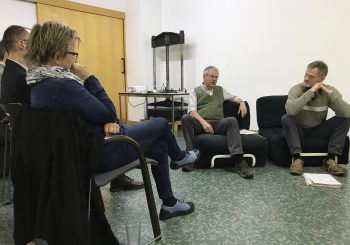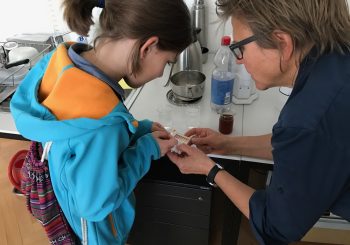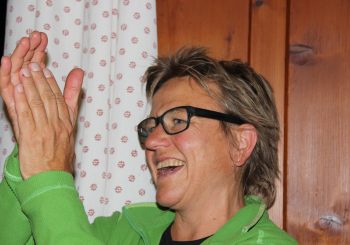-
Nothing ventured, nothing gained: Sylvia Lutz
Posted on March 7, 2018 Sylvia Lutz, Vice-Treasurer, Bodenfreiheit, Austria
Sylvia Lutz, Vice-Treasurer, Bodenfreiheit, Austria“The face of the earth was changed by humankind in just two generations. It is important to do something now, however small”
What is your job? I’m volunteering as finance officer with Bodenfreiheit. We check payments of our members, reach out to those who forgot to pay their membership fees and prepare lists of members entitled to take part in decision making at our annual meetings.
Additionally I work on developing strategies on how to make use of land we could acquire. Our use-cases depend largely on the ecological status, the possible integration of neighbours and the possibility of reaching as many people as possible. Recently we acquired a very small – but important – strip of land which would be the access road to a vast open field. Not everybody is happy with our ownership of such strategically important but small pieces of land.
I went out with ecologists to assess the status and developed three use-cases which the general assembly will have to vote upon.
How long have you been working for your organisation?
I started days after Bodenfreiheit was founded back in 2011. And I’ve been a member ever since then.
What inspires you most about what you do?
There is so much we could grumble about, so much we can criticise. The most important things are those where you can directly create an actual impact. Show positive change in reality and not only discuss about it in theory. And that’s what we try to do at Bodenfreiheit: Change the policies of spatial planning in our state – not with petitions and criticism but with concrete examples in the real world. And it is starting to create impact.
Why do you think your work is so important?
The face of the earth was changed by humankind in just two generations. With ever accelerating speed. It is important to do something now. Be it as small as our activities. Still they make sense.
What’s it like working as a woman in your organisation?
Like in a lot of organisations there are the men who speak up and often take the first row. In my position I remind my fellow male board members about the lack of women in the board, about the position of women, about possible female keynote speakers and so on.
And they do take up my point. But it still needs somebody having female positions in mind. They are still not taken into account automatically.
Do you think the industry your work in has changed over the last 100 years for women?
We are living at a time of rapid change. Most of the time things around us change with such tremendous speed that it is really hard keeping track of it.
So we need people with a clear and straightforward focus on gender and equality to remind others. To raise their voices on behalf of those who are usually under-represented. But things do move in the right direction.
What questions would you like to ask another inspiration woman from one of our international organisations?
What is it we could learn from each other to strengthen gender equality without entering into the power games men are so good at?
What is Bodenfreiheit?
Bodenfreiheit (“freedom for our soil”) is a registered non-profit organisation in the westernmost state of Austria: Vorarlberg, and one of INTO’s more recent members.
Spatial planning in the 1979s and 80s did not take into account the need for free space. Most of the Vorarlberg’s arable land was designated as building land. More than 40% has not yet used but is subject to speculation and treated as as a ‘safe-haven’ for financial assets. This leads to shortages on the land market and therefore more of the scarce free spaces are being incorporated into building land. A vicious circle which needs to be broken.
Bodenfreiheit applies a sort of paradox intervention. All members pay an annual fee of EUR 120, with which strategically important land is bought and kept free and accessible for the public. It is a symbolic act with a very tangible effect.

 44 (0)20 7824 7157
44 (0)20 7824 7157


